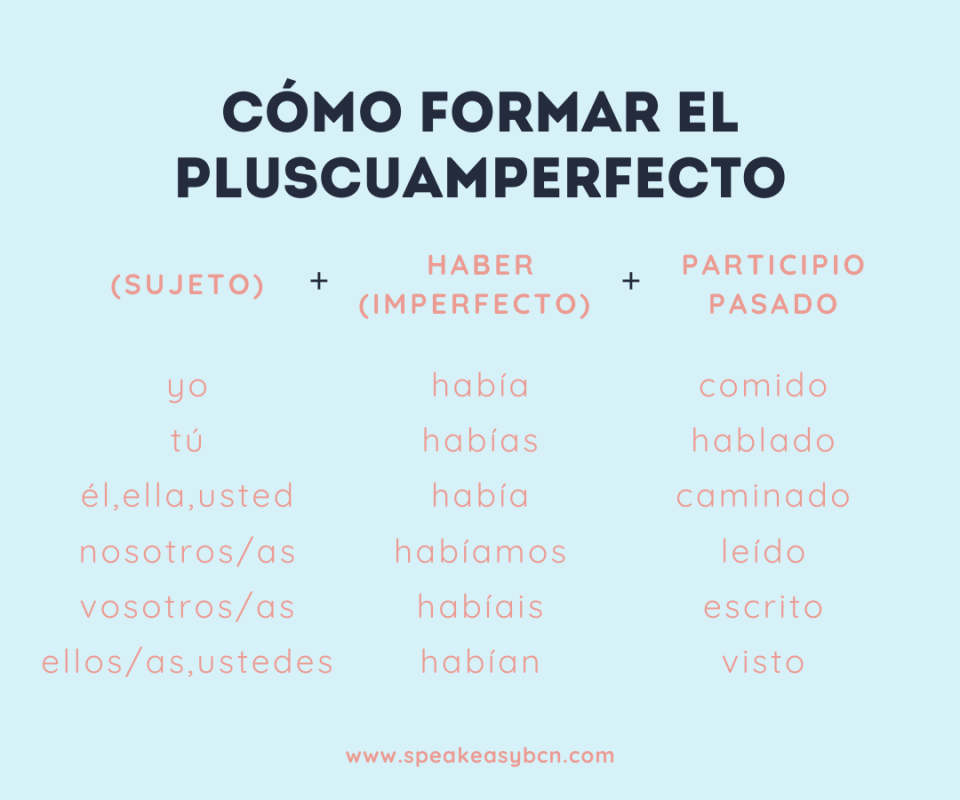How do we talk about past events that happened *_prior_* to those past events? If you are already familiar with the _pretérito perfecto_ and the _imperfecto_, the _pluscuamperfecto_ tense in Spanish will be easy for you to master! Read on to learn more about the use and formation of the Spanish _pluscuamperfecto_.

When to use the pluscuamperfecto
1. The Spanish pretérito pluscuamperfecto (or pluperfect in English) is used to describe events or actions that have happened further back in the past than a past action we are referring to.
If you think about it in English, it would be something like:
“When I got home yesterday, my mom had already left for work.
Two actions have usually happened. In the example, the first is that my mom had left, and the second is that I got home. My mom had left before I arrived home.
2. There is another special use for the pluscuamperfecto. If you are talking about an experience that you’ve never had before that you are experiencing this very moment, you can use the pluscuamperfecto.
For example:
Nunca había estado en París antes.
I had never been to Paris before (until now).
You had never been in Paris until now is what the sentence is saying.
Be careful, this should not be confused with a sentence about an experience that you’ve never had.
Nunca hemos ido a Disneyland.
We have never gone to Disneyland.
How to form the pluscuamperfecto
The pretérito pluscuamperfecto is very easy to form. The formula is as follows:
(subject) + verb haber in imperfecto + past participle
If you would like to learn how to form the past particple, you can take a look at this article about the pretérito indefinido and well as this article about forming the imperfecto.

Examples of the pluscuamperfecto
Now that you know how to use and form the pluscuamperfecto, here are some examples of the verb tense in use:
Cuando llegué a la fiesta, ya se había acabado toda la comida.
When I arrived at the party, all the food had already been finished.
In this example, the action of the food being finished has happened before I arrived at the party.
Llegué corriendo a la estación pero mi tren ya había salido.
I arrived at the station running but my train had already left.
In this example, the train left before I arrived at the station.
Laura no ha ido al cine con nosotros porque ya había visto la película.
Laura didn’t come to the movies with us because she had already seen the film.
Laura had seen the movie before we went to the movies, there we need to use pluscuamperfecto de describe this action.
Nunca había probado una paella tan buena.
I had never had a paella this good (until now).
This is one of the special ways that indicate an experience that hasn’t happened until this moment.
Posted in Learn Spanish
Learn and improve your Spanish in Barcelona, one of the world's most vibrant and exciting cities.
Here at Speakeasy BCN you'll find courses for all abilities and timetables, an incredible team of talented and motivated teachers and classmates to share your interests and passions. And if you need a visa for your stay, then of course we're able to help and advise.

Start your learning Spanish in Barcelona adventure
Let us know if you have any questions about our courses, our school and life at Speakeasy.